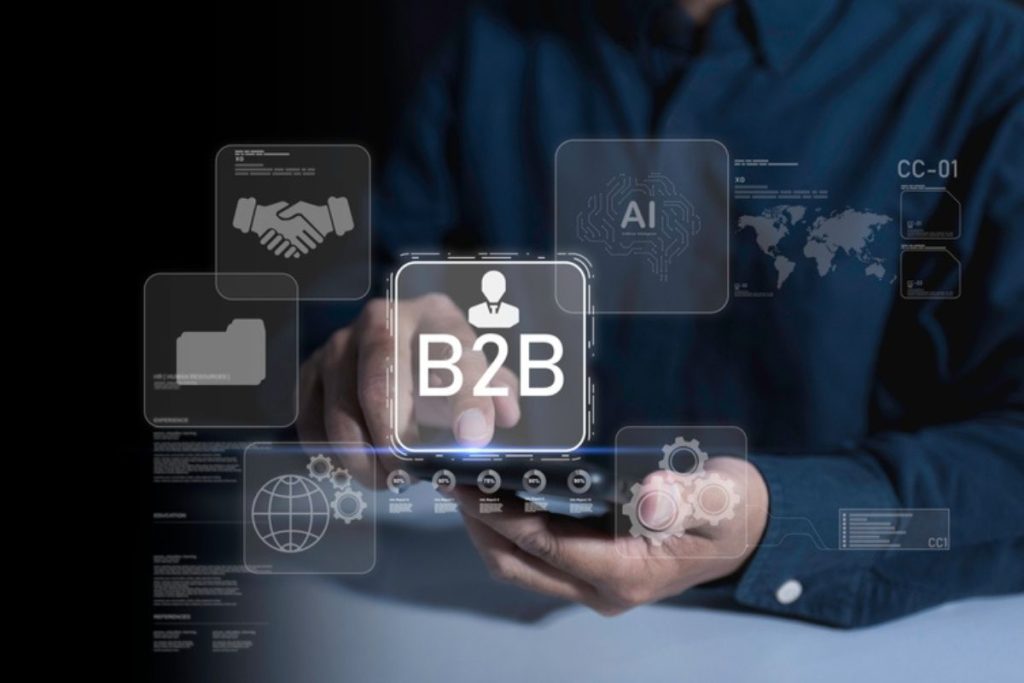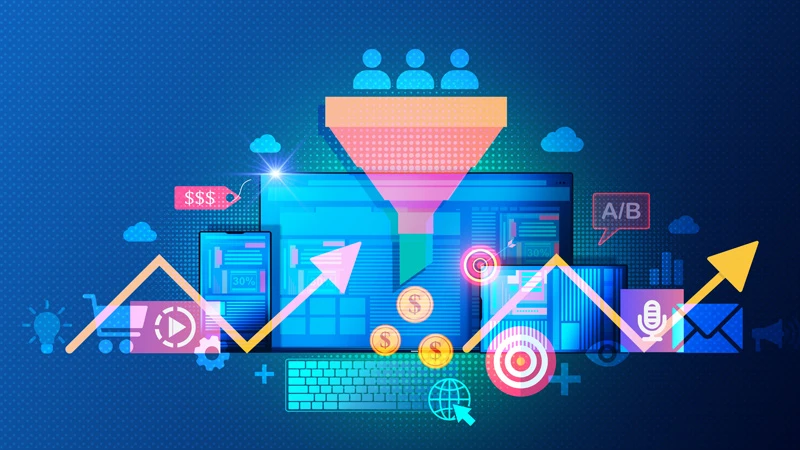Leveraging Growth Systems For B2B for smarter supply chain decisions
Wiki Article
AI Automation for B2B: Strategies to Boost Your Organization Performance
AI automation in the B2B field provides an essential opportunity for organizations to improve their performance. By improving procedures and improving decision-making, businesses can accomplish considerable efficiencies. Nonetheless, the effective combination of AI requires mindful factor to consider of different aspects. Understanding which areas to automate and choosing proper tools are simply the beginning. The capacity for improvement raises vital concerns about application and ongoing assessment. What methods will ensure enduring success in this developing landscape?Comprehending AI Automation in B2B Context
As companies progressively seek performance and advancement, recognizing AI automation in the B2B context ends up being essential. AI automation leverages sophisticated technologies to streamline processes, boost decision-making, and improve overall productivity. By integrating AI devices, firms can optimize operations such as supply chain management, client connection administration, and data evaluation. These modern technologies can analyze vast amounts of data swiftly, supplying actionable understandings that drive tactical efforts. Furthermore, AI-driven automation minimizes human mistake and maximizes staff members to concentrate on more complex jobs. By cultivating collaboration in between human knowledge and maker capabilities, services can attain an affordable side. Ultimately, recognizing AI automation is vital for B2B companies aiming to grow in a progressively digital market.Recognizing Areas for Automation
In the mission for reliable AI automation in B2B, it is vital to recognize particular locations where automation can produce significant advantages. This consists of reviewing job repetitiveness, exploring possibilities for data processing, and pinpointing process traffic jams. By concentrating on these aspects, organizations can streamline operations and improve performance.Job Monotone Assessment
Job repetitiveness analysis plays a vital function in determining areas ripe for automation within B2B procedures. This process involves analyzing day-to-day tasks to identify which are repeated and lengthy, thereby hindering efficiency. By looking at process, companies can pinpoint certain features that require too much hands-on input, such as data entry, invoice processing, or customer follow-ups. Identifying these recurring tasks enables organizations to designate sources more efficiently, enhancing overall efficiency (Growth Systems For B2B). Additionally, automation can reduce human mistake, streamline procedures, and complimentary up employees to concentrate on higher-value activities. Performing a thorough task monotone evaluation empowers B2B organizations to adopt targeted automation methods, ultimately driving enhanced efficiency and competitive advantage in the marketInformation Handling Opportunities
Countless data processing possibilities exist within B2B organizations, providing significant potential for automation. These possibilities frequently occur in areas such as information entry, billing processing, and client partnership administration. By automating information collection and recognition processes, companies can decrease human mistake and improve effectiveness. Furthermore, automating report generation permits teams to gain access to real-time insights, cultivating timely decision-making. Stock management systems can also gain from automation, streamlining supply tracking and order processing. Furthermore, leveraging AI in data analytics enables organizations to discover fads and patterns that might or else go undetected. Ultimately, accepting automation in these locations not only optimizes operations but also frees up useful resources, enabling workers to focus on strategic efforts that drive growth.Operations Traffic Jam Identification
Recognizing operations bottlenecks is a critical action in realizing the complete advantages of automation within B2B organizations. These bottlenecks commonly manifest as hold-ups, resource restrictions, or inefficient procedures that prevent performance. To properly identify these locations, organizations can carry out comprehensive analyses of their process, making use of metrics such as cycle time and throughput. Engaging workers in conversations concerning discomfort points can likewise supply beneficial understandings. Companies can prioritize them based on influence and usefulness for automation when traffic jams are identified. By tactically dealing with these ineffectiveness, B2B business can streamline operations, enhance partnership, and inevitably enhance overall efficiency. This aggressive strategy to process assessment lays the foundation for successful automation efforts that drive company development.Choosing the Right AI Tools and Technologies
As organizations increasingly turn to AI to improve their operations, picking the right tools and modern technologies becomes essential for attaining preferred outcomes. Organizations has to review their certain demands and objectives, thinking about elements such as user-friendliness, compatibility, and scalability. A detailed market analysis can assist identify leading AI services tailored for their sector. In addition, companies need to analyze the technical framework required to support these tools, making certain seamless integration with existing systems. Information protection and compliance with policies are additionally critical factors to consider that influence tool option. By concentrating on these criteria, companies can make enlightened decisions that drive effectiveness and productivity, eventually leading to boosted organization efficiency. The appropriate AI tools empower companies to innovate and preserve an one-upmanship in the marketplace.Creating a Strategic Application Plan
An effective strategic execution prepare for AI automation in B2B requires clearly defined key objectives. Minarik AI. Additionally, organizations must evaluate their current abilities to recognize voids and possibilities for renovation. Continual tracking and change of the technique will guarantee positioning with progressing company requirements and modern technology innovationsSpecify Key Objectives
To assure effective AI automation in B2B settings, defining essential purposes is necessary for establishing a critical application strategy. Organizations has to determine particular, quantifiable goals that align with their total business technique. This clarity provides a roadmap for the automation procedure, ensuring that initiatives are concentrated on areas that will certainly yield the highest effect. Trick objectives might consist of improving operational performance, improving customer contentment, or boosting income. Establishing these objectives allows teams to prioritize resources effectively and track progression over time. In addition, clear goals help with better communication among stakeholders, promoting cooperation and alignment throughout the company. Ultimately, distinct goals serve as the structure for a robust AI automation method that drives company efficiency.
Evaluate Existing Capabilities

Monitor and Change
Carrying out AI automation needs a dynamic technique that emphasizes continual surveillance and modification - Minarik AI. Services must establish a calculated implementation plan that includes normal assessments of AI performance versus predefined metrics. This entails monitoring crucial performance indications (KPIs) to examine the performance of automation solutions. By assessing data, companies can recognize locations for renovation and tweak their AI systems accordingly. Involving with stakeholders throughout the procedure ensures that the automation lines up with service purposes and user needs. In addition, fostering a society of adaptability enables companies to react quickly to altering market conditions and technical innovations. Eventually, recurring tracking and adjustment not just boost operational effectiveness yet likewise drive sustained company efficiency in the competitive B2B landscapeEnsuring Data Quality and Integration
As organizations significantly rely upon AI automation in B2B procedures, ensuring data top quality and integration comes to be important for success. High-grade information is vital for accurate analytics, educated decision-making, and effective consumer involvement. Information should be cleaned, standard, and validated to remove errors and variances that could lead to misguided insights. Furthermore, seamless assimilation across various platforms and systems is necessary; disparate information silos prevent automation initiatives and reduce operational effectiveness. Organizations must adopt robust data governance structures and use innovative devices to promote information combination while keeping top quality requirements. By prioritizing these elements, companies can enhance their AI automation campaigns, ultimately leading to enhanced performance and an affordable go to my site benefit in the B2B landscape.Gauging Success and ROI of AI Initiatives
Just how can companies efficiently measure the success and roi (ROI) of their AI campaigns? To determine effectiveness, businesses ought to develop clear, measurable goals aligned with tactical purposes. Secret efficiency indicators (KPIs) such as expense savings, earnings development, and productivity improvements can provide useful insights. Organizations frequently perform standard evaluations prior to applying AI, enabling them to contrast pre- and post-implementation metrics. Additionally, analyzing consumer satisfaction and engagement can disclose the effect of AI on customer experience. Frequently examining these metrics helps in refining AI techniques and making sure placement with business goals. By utilizing an organized approach to measurement and assessment, organizations can properly assess the efficiency of their AI campaigns and make notified decisions about future financial investments.Conquering Difficulties in AI Adoption

Frequently Asked Questions
Just How Can AI Automation Improve Consumer Partnership Monitoring in B2B?
AI automation can improve consumer relationship monitoring in B2B by streamlining interaction, giving personalized communications, assessing consumer data for understandings, automating follow-ups, and boosting feedback times, eventually cultivating more powerful relationships and driving sales growth.What Industries Benefit The Majority Of From AI Automation in B2B?
Manufacturing, money, health care, and logistics industries benefit most from AI automation in B2B. These sectors leverage automation to simplify procedures, enhance information analysis, boost consumer interactions, and inevitably boost functional effectiveness and success.How Does AI Automation Effect Worker Roles in B2B Firms?
AI automation transforms staff member functions in B2B companies by streamlining jobs, decreasing repetitive job, and enabling staff to focus on critical efforts. This change improves performance and cultivates a culture of advancement and versatility.What Are the Expenses Related To Carrying Out AI Automation?
The prices associated with executing AI automation consist of preliminary software acquisition, framework upgrades, training expenses, ongoing upkeep, and potential assimilation difficulties. Minarik AI. Firms need to likewise take into consideration long-lasting functional shifts and employee adjustment expenditures in their economic preparationHow Can Services Make Certain Ethical AI Usage in Their Workflow?
Businesses can ensure moral AI usage by developing clear standards, advertising transparency, carrying out normal audits, involving varied stakeholders, and prioritizing information personal privacy. Continuous training and awareness programs even more boost understanding and adherence to honest techniques.As organizations increasingly look for efficiency and development, comprehending AI automation in the B2B context becomes important. In the mission for reliable AI automation in B2B, it is important to identify particular areas where automation can generate significant benefits. An effective tactical execution strategy for AI automation in B2B calls for clearly specified key purposes. To guarantee effective AI automation in B2B environments, defining key goals is crucial for creating a critical implementation plan. As organizations significantly count on AI automation in B2B processes, making sure data top quality and integration comes to be essential for success.
Report this wiki page